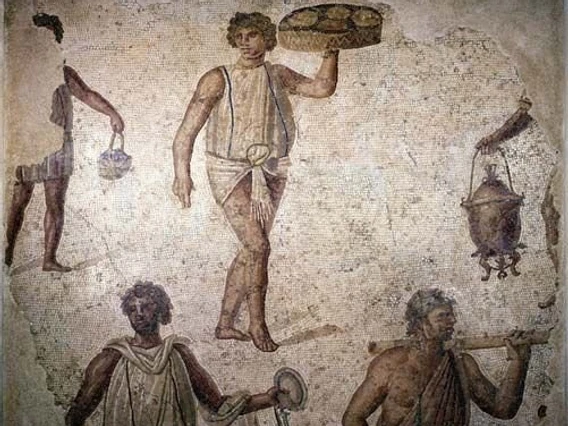
Mosaic of slaves preparing for or serving at a banquet
I anticipate that many of my readers will be surprised to see the relatively humane manner in which the institution of slavery is depicted in these novels, so I thought that I should begin this commentary with some observations about Roman slavery.
For us today, the word “slavery” conjures up a long, sordid history of native peoples being captured, sold, and abused by white colonizers who regarded them as little better than beasts of burden or intelligent tools. Some expressions of Roman slavery were every bit as bad as their modern counterparts, as with the slaves who labored in the mines and galleys that kept the Empire running. Slaves who belonged to poorer households often had trouble getting their basic needs met. Slaves at all levels of society could be beaten and abused at any time and for any reason by both their owners and anyone else to whom their owners granted permission.

Greek slave being beaten with a rod
Not all slaves, however, had it so bad. Those who worked in wealthy urban households could be assured of a place to sleep at night and enough food to eat, which was more than many poor free people could say. Those who were able to gain the favor of their master or mistress, as Marcus and Melita do in these stories, could enjoy freedoms and opportunities that were denied to other slaves.

Image from a sarcophagus of a Roman slave reading to his master from writing tablets
At the top of the Roman slave pyramid were a small number of individuals like Marcus who assisted their master or mistress in managing their social, economic, and political lives. Slaves at this level frequently found opportunities to earn money of their own through tips and paid work, money that they could use to buy property, start a business, or even purchase their own freedom. Some succeeded in amassing enough money to arouse the jealousy of members of old-line Roman families after they were freed. The boorish freedman was a stock character in Roman social satire.
Household slaves who served their owners well had a good chance of being liberated by the time they reached their 30s. Freed slaves were granted the rights of citizenship, though they still owed certain duties to their former masters as long as they lived. Their children, on the other hand, bore no such responsibilities, and those who used their resources to cultivate productive relationships could gain positions of prominence in the life of their city, though they still had difficulty finding acceptance among the elites.
Even the most privileged of slaves, however, remained the property of another person from birth to death, a status that left them subject to the whims and fortunes of their owners. Some were willing to accept this limitation in exchange for the comforts that they enjoyed as trusted members of a wealthy household, but the number of freed men and women that are known from ancient literature suggests that most slaves, like Marcus, were eager to be free and readily accepted liberation when it was offered.



